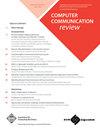2022年4月号
IF 2.8
4区 计算机科学
Q3 COMPUTER SCIENCE, INFORMATION SYSTEMS
引用次数: 0
摘要
2022年4月的这一期包含五篇技术论文和两篇社论。第一篇技术论文《对抗性设置中的数据平面安全应用》(Data-Plane Security Applications in对抗性设置)是由王亮(Liang Wang)及其同事撰写的,研究了为可编程交换机创建和运行数据平面应用程序时可能出现的安全问题。这项工作推动了这个特定领域的安全分析和设计向前发展。本文还呼吁对可编程交换机的数据平面应用的安全性进行更彻底的反思。第二篇技术论文,一个坏苹果可以破坏你的IPv6隐私,由赛义德·贾瓦德·赛义德和他的同事,利用IPv6被动测量来精确地指出,不可忽视的一部分设备将其MAC地址编码为IPv6地址。这会威胁到用户的隐私,允许内容提供商和cdn在多个会话和位置持续跟踪用户及其设备。总的来说,这篇论文是对隐私设计解决方案的杰出贡献,也是一项执行良好的测量研究,它澄清了问题,并提供了缓解问题的可靠建议。第三篇技术论文,超特定前缀:享受域间路由中的小事,由Khwaja Zubair Sediqi和他的同事,调查了过去十年中BGP互联网路由中高特定前缀(HSP)的存在。这些前缀比IPv4 (IPv6)的/24(/48)更具体,通常由自治系统操作员过滤。总的来说,这篇论文对理解BGP宇宙做出了很好的贡献,它给出了清晰的信息,并对该现象进行了很好的量化。作者清楚地展示并激励了这项工作,也为非专家提供了当今互联网路由复杂性的良好视图。第四篇技术论文,Nicola Bonelli及其同事的《用Nethuns编程与socket无关的网络功能》,提出了一种新的解决方案,可以在不同的网络I/O框架之上透明地开发数据包处理程序。作者设计并开发了一个开源库nethuns,作为网络功能的统一编程抽象,其原生支持多核编程。这项工作不仅与我们的社区非常相关,而且代码通过BSD许可开源发布,这可以用于促进该领域的更多研究,以统一终端主机网络的编程机制。第五篇技术论文是Mike Kosek及其同事撰写的《在不断增加的DNS响应规模时代,通过TCP测量DNS:边缘视角》,该论文研究了当今互联网的基础之一:域名服务(DNS)。DNS的原始RFC文档指示通过UDP (DoUDP)或TCP (DoTCP)发送查询。本文从故障率和响应时间两个方面对DoTCP进行了测量研究。最后,我们有两个编辑注释。由Dean H. Lorenz和他的同事撰写的《一个开放的可定制云网络的案例》,论证了连接到云的托管网络解决方案的新生态系统的可取性,概述了主要需求并概述了可能的解决方案。Vaibhav Bajpai及其同事的《设计混合会议的建议》提出了组织成功的混合会议的指导方针和考虑因素——跨越技术、组织和社会因素。我希望你会喜欢这一期,欢迎在CCR在线(https://ccronline.sigcomm.org)或通过电子邮件CCR -editor at sigcomm.org发表评论和建议。本文章由计算机程序翻译,如有差异,请以英文原文为准。
The April 2022 issue
This April 2022 issue contains five technical papers and two editorial notes. The first technical paper, Data-Plane Security Applications in Adversarial Settings, by Liang Wang and colleagues, investigates security issues that may arise when creating and running data-plane applications for programmable switches. This work moves security analysis and design forward in this particular area. This paper also calls for a more thorough rethinking of security for data-plane applications for programmable switches. The second technical paper, One Bad Apple Can Spoil Your IPv6 Privacy, by Said Jawad Saidi and colleagues, leverages IPv6 passive measurements to pinpoint that a non-negligible portion of devices encodes their MAC address in their IPv6 address. This threatens users' privacy, allowing content providers and CDNs to consistently track users and their devices across multiple sessions and locations. Overall, the paper is an excellent contribution toward privacy-by-design solutions and a nicely executed measurements study that clarifies the problem and provides solid suggestions to mitigate the problem. The third technical paper, Hyper-Specific Prefixes: Gotta Enjoy the Little Things in Interdomain Routing, by Khwaja Zubair Sediqi and colleagues, investigates the presence of high-specific prefixes (HSP) on the BGP Internet routing during the last decade. These prefixes are more-specific than /24 (/48) for IPv4 (IPv6) and are commonly filtered by Autonomous Systems operators. Overall this paper offers a nice contribution to the understanding of the BGP universe, with a clear message and a nice quantification of the phenomenon. The authors clearly present and motivate the work, offering also to not experts a nice view of the routing complexity of the nowadays internet. The fourth technical paper, Programming Socket-Independent Network Functions with Nethuns, by Nicola Bonelli and colleagues, proposes a new solution to transparently develop packet-processing programs on top of different network I/O frameworks. The authors design and develop an open-source library, nethuns, serving as a unified programming abstraction for network functions that natively supports multi-core programming. Not only is this work very relevant to our community, but also the code is released open-source through a BSD license, which can be used to foster more research in the area, towards unifying programming mechanisms of end-host networking. The fifth technical paper, Measuring DNS over TCP in the Era of Increasing DNS Response Sizes: A View from the Edge, by Mike Kosek and colleagues, studies one of the foundations of today's Internet: the Domain Name Service (DNS). The original RFC document of DNS instructs to send queries either over UDP (DoUDP) or TCP (DoTCP). This paper presents a measurement study on DoTCP focusing on two perspectives: failure rates and response times. Finally, we have two editorial notes. A Case for an Open Customizable Cloud Network, by Dean H. Lorenz and his colleagues, argues for the desirability of the new ecosystem of managed network solutions to connect to the Cloud, outlines the main requirements and sketches possible solutions. Recommendations for Designing Hybrid Conferences, by Vaibhav Bajpai and colleagues, presents guidelines and considerations-spanning technology, organization and social factors-for organizing successful hybrid conferences. I hope that you will enjoy reading this new issue and welcome comments and suggestions on CCR Online (https://ccronline.sigcomm.org) or by email at ccr-editor at sigcomm.org.
求助全文
通过发布文献求助,成功后即可免费获取论文全文。
去求助
来源期刊

ACM Sigcomm Computer Communication Review
工程技术-计算机:信息系统
CiteScore
6.90
自引率
3.60%
发文量
20
审稿时长
4-8 weeks
期刊介绍:
Computer Communication Review (CCR) is an online publication of the ACM Special Interest Group on Data Communication (SIGCOMM) and publishes articles on topics within the SIG''s field of interest. Technical papers accepted to CCR typically report on practical advances or the practical applications of theoretical advances. CCR serves as a forum for interesting and novel ideas at an early stage in their development. The focus is on timely dissemination of new ideas that may help trigger additional investigations. While the innovation and timeliness are the major criteria for its acceptance, technical robustness and readability will also be considered in the review process. We particularly encourage papers with early evaluation or feasibility studies.
 求助内容:
求助内容: 应助结果提醒方式:
应助结果提醒方式:


